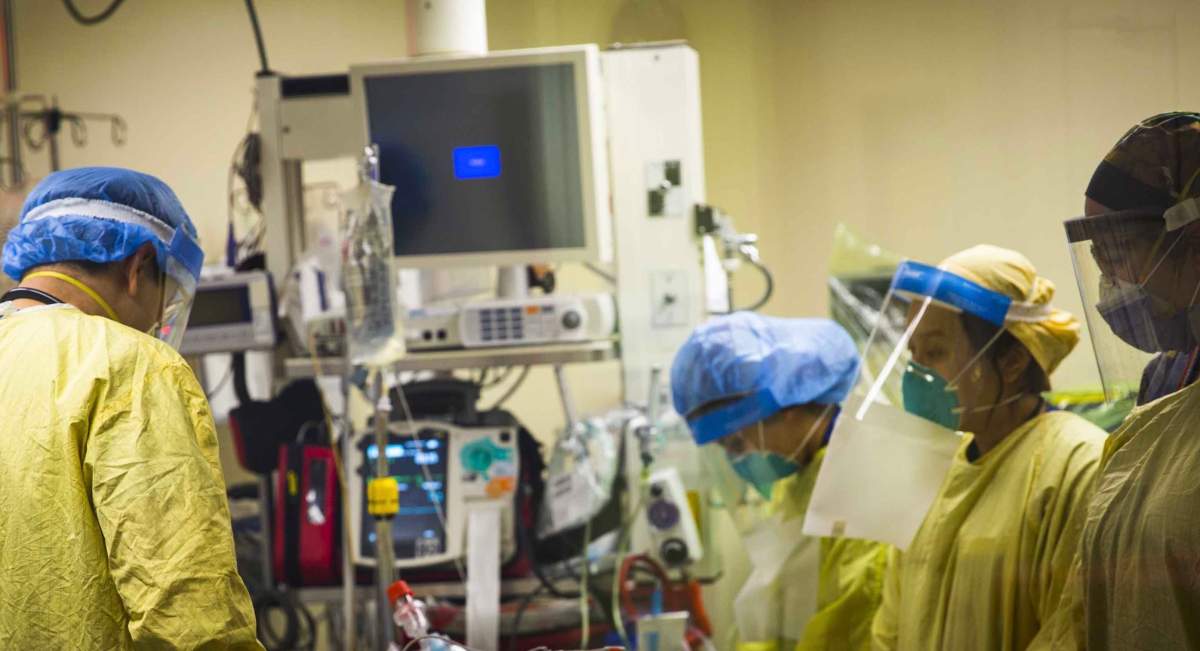Every shift, Dr. Dawn Lim knows to expect the unexpected.

“We are used to dealing with patients who are very sick. That’s not new,” Lim told Global News. “But patients with COVID, they look well until they don’t look well. And that’s been very scary.”
Lim is an emergency medicine physician at two downtown Toronto hospitals, part of the University Health Network.
When the novel coronavirus started to spread around the world, hospitals prepared and Lim had conversations with colleagues who lived through the severe acute respiratory syndrome (SARS) outbreak in 2003. One conversation with another doctor struck her.
“It was very hard for her team because afterwards, when the last patient was cured and they lifted the restrictions, it wasn’t something that they talked about,” Lim told Global News.
“I felt like this story couldn’t be forgotten the same way that SARS was forgotten.”
That is when Lim decided to pick up her camera and document the health-care teams as they cared for patients during the pandemic — her way of honouring their work.
After she finishes a shift or on her days off, Lim has been photographing her colleagues.
Her motivation is to create a permanent record: art and imagery to capture the moment, persistence and perspective, something that can be revisited and talked about in the future.

Get weekly health news
“I do hope that we have a chance to talk about that because I think it’s really important for us to understand what happened and to understand how it changed us and to understand where we go afterwards,” Lim told Global News.
She captures what she sees — care, compassion, precision and sometimes “controlled chaos” — through the lens of a photographer who understands the challenges.
Healing through storytelling
One of the challenges that is unique to this pandemic is the fear that COVID-19 patients could pass the virus to health-care providers caring for them. To reduce the risk, stringent personal protective equipment (PPE) protocols are in place and UHN created the Code Delta team, “which is an intubation team staffed by an anesthesia assistant, a nurse and a staff anesthetist.”
It also means teams are working inside and outside of glass walls communicating using baby monitors. In her photographs, Lim captures a physician whose role is to be the “runner doctor”; she is outside to provide the team at the patient’s bedside with anything it needs. Her eyes are laser-focused on her colleagues and the patient.
Another aspect distinct to fighting COVID-19 is the absence of family for safety reasons. This means the health-care teams are stepping in to fill the absence. One of Lim’s powerful photos captures the health-care team, heads bowed at the time of death of a patient.
“This is the pause that our teams do at the time of death to pay respects to the patient,” Lim explains. “This patient had only the medical team to say goodbye. So, you know, looking at this, I think this was a very special moment for this team as well, because they knew that they tried to do everything that they could and still they lost the patient … a very moving photo for the team as well.”
They are difficult moments, but Lim also sees the unification, as the teams care for patients, the daily sacrifice and commitment to fighting COVID-19. It’s the dedication and the reason they come to work she hopes to capture.
She also hopes her photo essay will help the public understand what is happening inside the hospital and show the care and dedication of the health-care teams.
“Storytelling for me is the most powerful tool that we have for connection and healing,” Lim said. “I hope that by doing this photo essay, people remember that feeling that they had when we came together as a team. That’s what I hope that they take away from it, because I think that’s the power of art. It gives us permission to pause and reflect.”
To see more of Dr. Lim’s photo essay follow this link.













Comments
Comments closed.
Due to the sensitive and/or legal subject matter of some of the content on globalnews.ca, we reserve the ability to disable comments from time to time.
Please see our Commenting Policy for more.